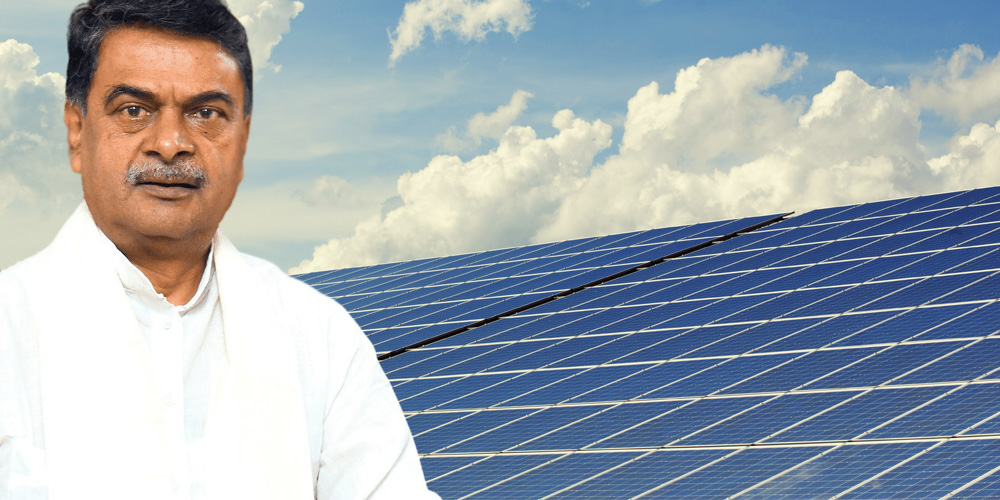
MNRE is to introduce a new scheme to promote distributed renewable energy for livelihood
R.K. Singh, Union Minister, Ministry of New & Renewable Energy recently announced a new credit scheme distributed applications of renewable energy (DRE) at 'National Summit on Powering Sustainable Livelihoods' organized by the Council on Energy, Environment and Water (CEEW) and Villgro Innovations Foundation's Powering Livelihoods initiative.
The Council on Energy, Environment and Water (CEEW) and Villgro Innovations Foundation's Powering Livelihoods initiative recently hosted the National Summit on Powering Sustainable Livelihoods, where R.K. Singh, Union Minister, Ministry of New & Renewable Energy, announced a new credit scheme distributed applications of renewable energy (DRE).
He declared, "The government intends to lower the cost of distributed renewable energy (DRE) livelihood equipment. Numerous efforts are already being made on the ground, and our scheme might help lakhs of families nationwide.”
Subsidies and Loan Guarantee
Singh also talked about having tie-ups with banks to facilitate the loan for easy solar setup. He said, “One of the components of this will be tying up with the banks. If a household wants to own a solar dryer, they should be able to get a loan from the bank, and we will work towards that. Manufacturers and users of DRE for livelihoods are pioneers, and now the government will scale it up to the next level”
Ananth Aravamundan, the Sector Lead for Climate Action at Villgro, underlined the need for credit guarantee programmes over subsidies at the occasion.
“Subsidies are a temporary workaround for the obligation. They may entice consumers to purchase, but when the subsidy is eliminated, the market collapses. In the field of renewable energy, we have repeatedly observed this. Therefore, what actually occurs is that you are briefly inflating the market rather than strengthening it. A loan guarantee has a considerably longer period and contributes to increasing the inherent strength of the market by enabling farmers to borrow money at affordable interest rates and without the need for significant collateral. This is the best approach to promote any product”, he claimed.
Reports by CEEW and Villgro
Minister Singh released two new reports by CEEW and Villgro, that highlights clean energy can impact 37 million people’s livelihoods in the agriculture and textile sectors in India and can provide a market opportunity worth almost Rs 4 lakh crore (around USD 50 billion).
He also talked about how this is going to impact industrial growth and would result in improved livelihood. He said, "We will, however, need large-scale manufacturing and standardisation of distributed applications of RE to lower prices and expand the sector. We have seen the potential of grid-scale solar power; India will scale up distributed applications of renewable energy for livelihoods. Just like we have a large programme on rooftop solar and solar irrigation, we will create a large programme for DRE livelihoods,"
Additionally, he discussed how this will affect industrial development and improve the livelihood. However, in order to reduce costs and grow the sector, there will need to be extensive manufacturing and standardising of distributed application of RE. Grid-scale solar power has potential, and India will expand distributed applications of renewable energy for livelihoods. We will establish a sizable programme for DRE livelihoods, just as we do for rooftop solar and solar irrigation.
Implementation of the Scheme
Various central / state agencies are putting various Ministries' and Departments' Implementation Cell Schemes into action. Technical assistance for DRE livelihood applications will be provided in coordination with these implementing agencies by SNAs for Renewable Energy with expertise in the RE sector. For DRE-based livelihood applications, SNAs may establish a State Implementation Cell, bringing together the State Departments involved in their implementation on a single platform. The State Implementation Cell's general mandate may be to:
-
Identify livelihood-supporting schemes and programmes that can be supported by renewable energy.
-
Determine key locations where such applications will be introduced in the State.
-
Supervise and track the execution of applications for sustainable livelihoods.
-
Align human and financial resources for the State's efficient implementation of RE-based livelihood applications.
-
Create both short- and long-term initiatives to promote DRE-based livelihood options. Make suggestions to the Central Technical and Skill Subcommittee regarding several facets of the DRE framework's implementation in the State.
-
SNAs may request and review proposals for the deployment of DRE-livelihoods solutions from local NGOs and CSOs. An internet gateway could be added to the digital catalogue produced for public awareness to offer project data, applications, and registrations.
Source- https://mnre.gov.in/img/documents/uploads/file_f-1644909209115.pdf

 Call us
Call us Contact
Contact  Whatsapp
Whatsapp  Solar
Solar